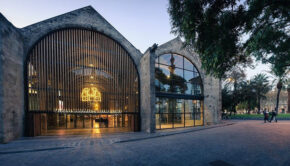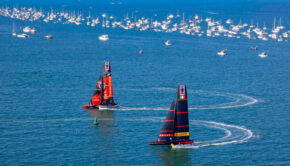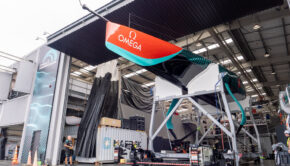America’s Cup: A review of the rules to change boats
Published on April 5th, 2015
The recent America’s Cup boat change from AC62s to AC48s has been extremely controversial. Never before in the more than century and a half history of the America’s Cup has the boat class been switched in midstream.
This change caused one of the best financed, most experienced teams – Luna Rossa Challenge – to pull out after spending tens of millions of US dollars. The most experienced AC team, former Cup holder and AC34 match finalist Team New Zealand, teeters on the brink.
While the change was promoted as a cost-savings matter, this commentary will go through the documents and the law regarding that change… and whether this option existed.
Question this commentary. Check it against the documents and the law governing document interpretation, which lawyers and courts call “contractual interpretation.” You can find those rules on the internet or ask your lawyer friends. If anyone claims this analysis is “flawed,” ask what the flaw is and check the documents yourself.
So was the change of boat legal? Let’s see. The documents to consider besides the Dead of Gift are the then governing Protocol (not the current one) and the then governing AC62 Class Rule (again not the current one). The applicable rules of contractual interpretation are simple:
1. In any deal you read all the documents together.
2. Specific provisions take precedence over general provisions.
3. Every provision of the combined documents must be given effect so that no provision is superfluous.
We also have to remember a couple of indisputable facts. First of all, no one has claimed that the boat change was made under Class Rule 4.1 (Amendment) of the AC62 Class Rule, which, with exceptions in 4.1 (a) (b) and (c) no one claims apply, requires unanimity. That is probably because although there are those exceptions to unanimity, the requirements of those exceptions could not be met. The claim is that the boat change was made as an amendment to the Protocol by majority vote.
The documents are governed, as is the Deed of Gift, by New York law. Protocol 1.1 (c) provides that the AC62 Class Rule means the class rule for the AC62 Yachts to be used in the main event. Protocol 1.1 (h) provides that AC62 Yacht means a yacht conforming to the AC62 Class Rule. So, according to the Protocol, AC35 will be sailed in boats conforming to the AC62 Class Rule, which can only be amended pursuant to Class Rule 4.1 by unanimous consent. The specific Class Rule 4.1 amendment provision of the AC62 Class Rule governs, not the general amendment provision of the Protocol. Every provision of the combined documents is given effect.
One of the most important provision of the Protocol is 35.2, which provides: “AC62 Class Rule: GGYC and the Challenger of Record shall publish the AC62 Class Rule prior to the start of the Entry Period.” Don’t forget that the AC62 Class Rule provides that it can only be amended by unanimous vote pursuant to Class Rule 4.1. Protocol 35.2 is a promise and representation that AC35 will be sailed in AC62’s unless amended pursuant to Class Rule 4.1.
That promise and representation was obviously made to induce reliance by the teams that they could count on the AC62 being the boat before they entered and started paying out money. Otherwise, nobody in their right mind would have entered and spent millions of dollars. That makes perfect sense.
When a 75 lb. sailor buys a Byte and travels to a regatta that the Notice of Race says will be sailed in Bytes according to the Byte class rule, she doesn’t want to find out when she gets there that the event will be sailed in Finns. Likewise, a 250 lb. Finn sailor doesn’t want to buy a new Finn, get to a Finn Gold Cup and find out it will be sailed in Bytes because Finns are just too expensive and a majority of the entrants can’t afford them. This is even more so in a design competition where there is a long lead time and much expense designing a boat from scratch.
Moreover, if the AC62 Class Rule could be changed by majority vote, any time a competitor developed a design breakthrough within the Class Rule, the other competitors could simply ban the design breakthrough by amending the class rule. Innovation would be banned – in a design competition.
There is a reason your stockbroker and the issuers of securities avoid making promises and representations regarding how a security will perform. It’s the same reason why car companies tell you that your actual mileage may vary. The reason is that if you make a promise or representation, the other party reasonably relies on that promise or representation to make an investment, and you breach the promise or representation, you are in deep legal trouble. The non-breaching party is entitled to compel you to fulfill the promise or representation or can recover damages.
The organizers of AC35 have breached their representation that AC35 would be sailed in AC62s and legally are in the wrong.
What about the fact that a majority of the challengers think the AC62 is a bad idea and too expensive for them? The answer to that in our legal system is simple: tough. Everyone made a deal and a deal’s a deal.
What about the broad goals stated in Protocol 2 about the goals of the event? To the extent those platitudes have any real meaning, the deal is controlled by the specific provisions of the AC62 Class Rule 4.1 requiring unanimity, not those platitudes.
What about the argument that the majority isn’t amending the AC62 Class Rule, but is merely amending the Protocol to substitute a different boat? That doesn’t pass the straight face test because it violates the rules of contractual interpretation that the specific Class Rule 4.1 governs and that all provisions of the deal must be given effect, including Rule 4.1 of the AC62 Class Rule. Otherwise, Class Rule 4.1 would be superfluous in violation the rules of contractual interpretation.
Moreover, it makes no sense because there would never be a need to amend the AC62 Class Rule and Class Rule 4.1 would be superfluous. If you wanted to change the AC62 Class Rule, you would only have to create a new AC62.1 class and substitute that for the AC62 by amending the protocol even if you didn’t have the votes to amend the AC62 Class rule pursuant to 4.1.
What about the argument that AC62 is bad for the Cup and a smaller one design boat is necessary to perpetuate the Cup? That is a silly argument with no legal force. A deal’s a deal. Besides, America’s Cup 34 with a couple of tweaks could have produced a world class AC35. The lust for the root of all evil forced the abandonment of that model without any attempt to negotiate a deal with San Francisco, and, as lovely and tax free as Bermuda is, AC35’s problems are not caused by the AC62.
Of course, if a new boat had merit, everyone could have been convinced to amend the AC62 Class Rule. Instead the modus operandi was to strong-arm the dissenters and shove it down their throats on practically no notice in violation of Class Rule 4.1. That was neither legal nor very smart.
So, bottom line, does the substitution of the new boat violate the Protocol and AC62 Class Rule? The answer is yes, it violates the Protocol and AC62 Class Rule. Is the result legitimate? The answer is no, it is not legitimate. Is the event that’s going forward legitimate? Good question. It may turn out that some future challenger may claim that AC35 should be thrown out, just as GGYC got Alinghi’s version of AC33 thrown out.
What can anybody do about it? Another good question. Had anyone protested, all of the restriction in the Protocol like no lawyers, etc., would have fallen away. Protocol 11.19 provides that the protest/arbitration is governed by New York Law and the protest/arbitration is a New York arbitration. Thus Article 75 of the New York Civil Practice Law and Rules supersedes contrary provisions of the Protocol and guarantees to the parties the right to be represented by counsel, to subpoena and cross examine witnesses and a host of other rights. If the Panel does not adhere to Article 75, the New York Supreme Court can vacate the result.
So there you have it. Where the America’s Cup goes from here is up in the air. Read this commentary and the documents, and decide for yourself. – Publius









 We’ll keep your information safe.
We’ll keep your information safe.